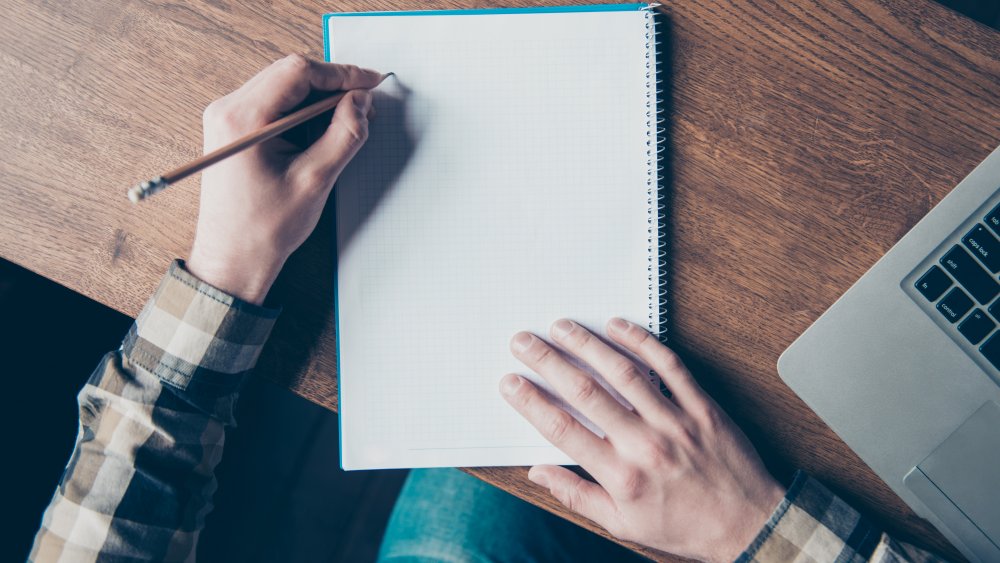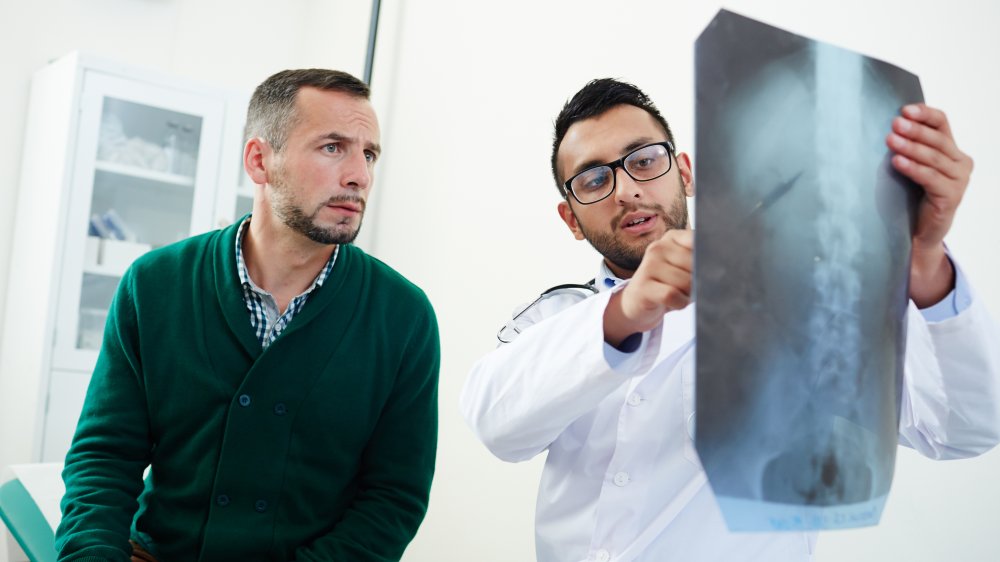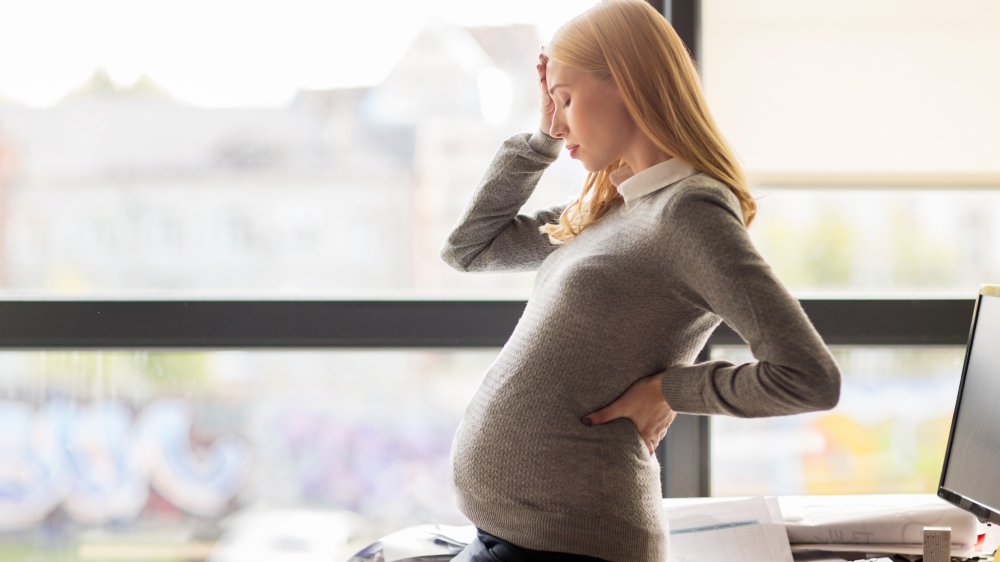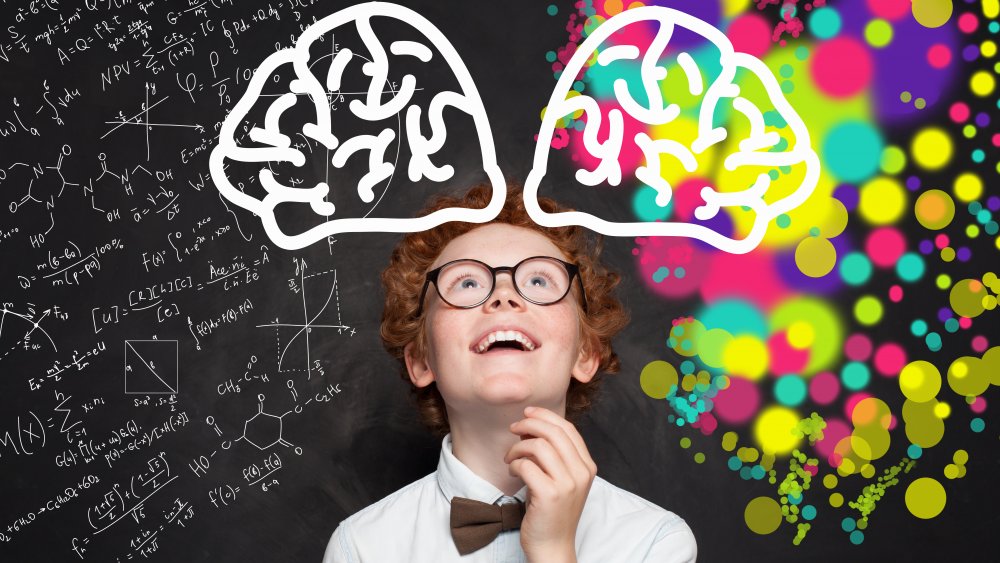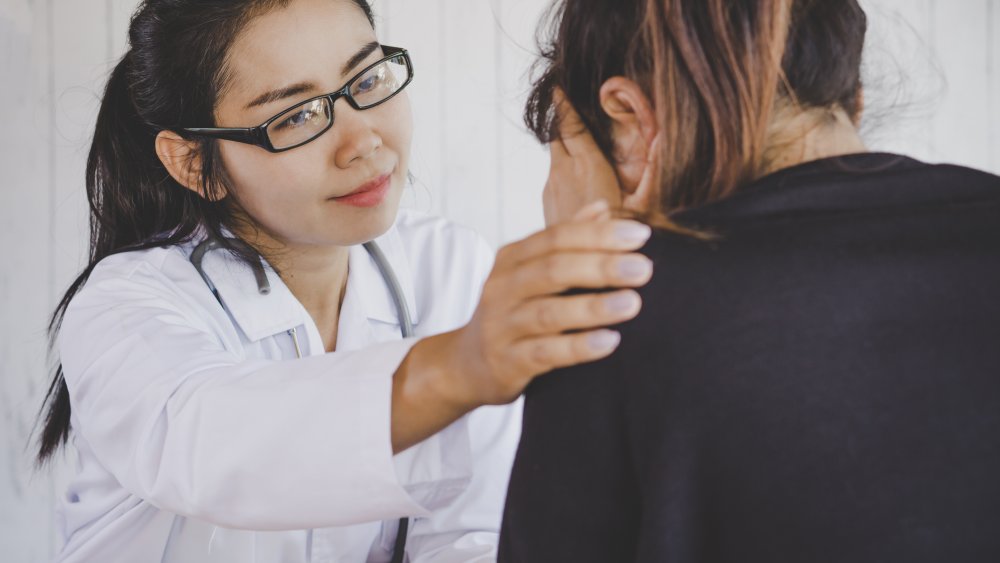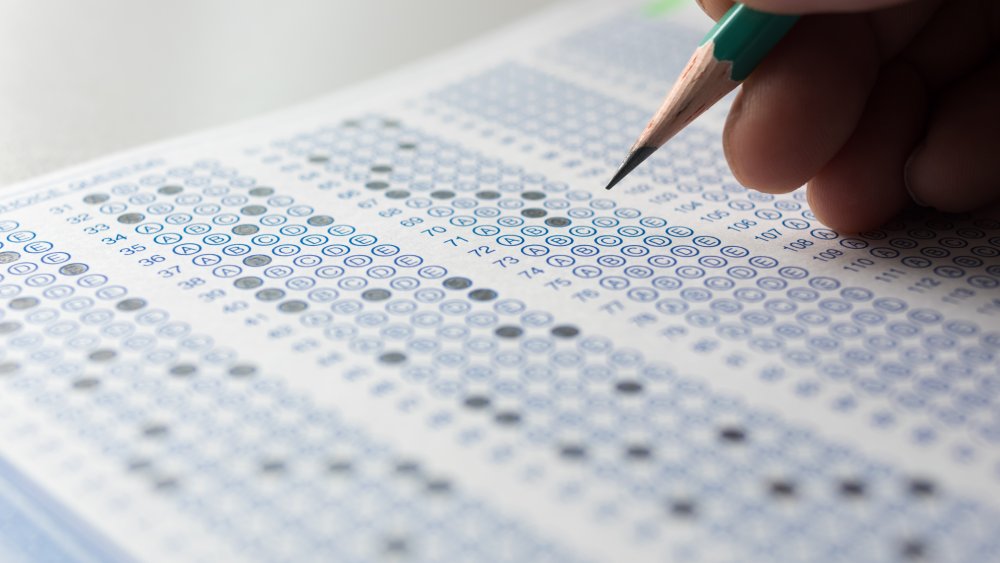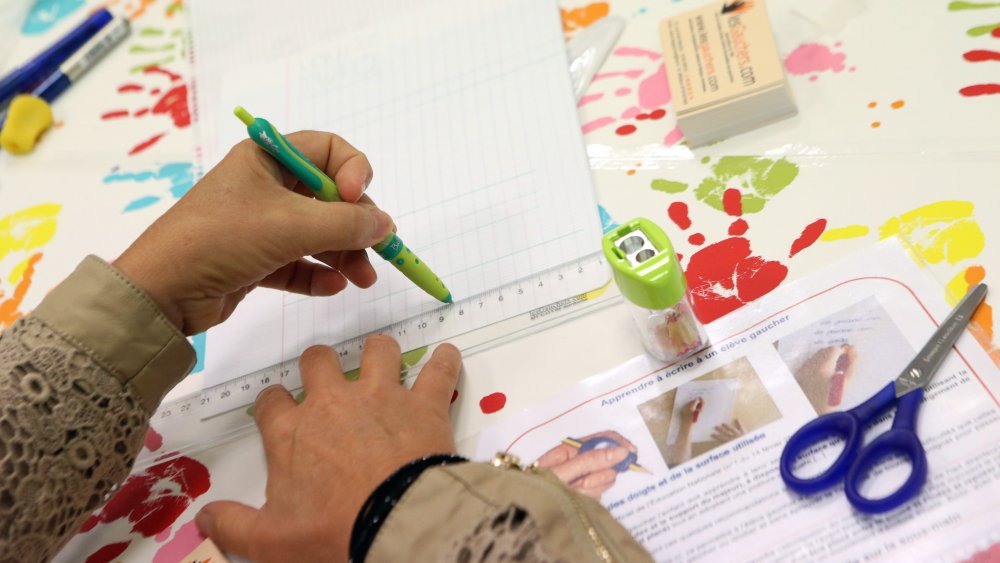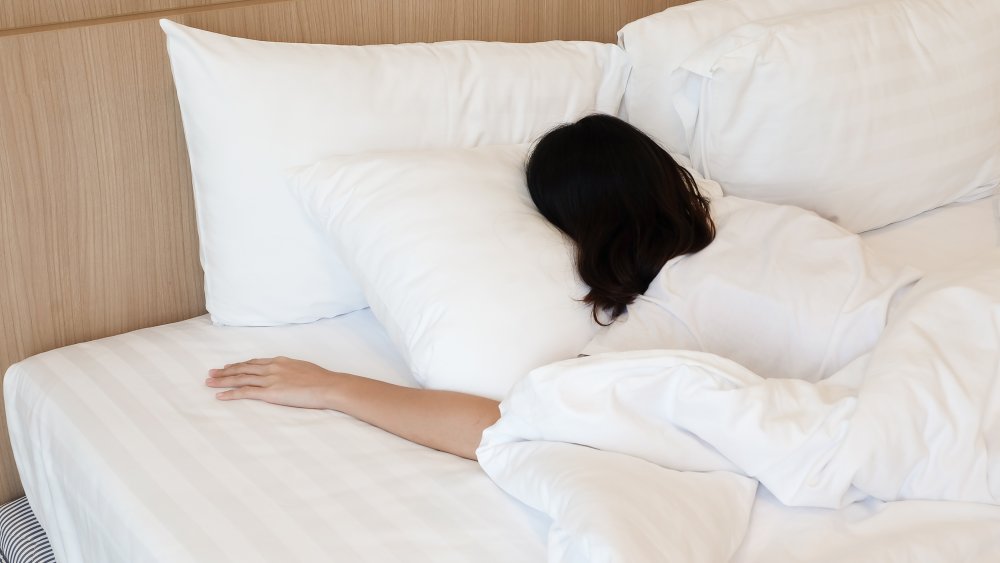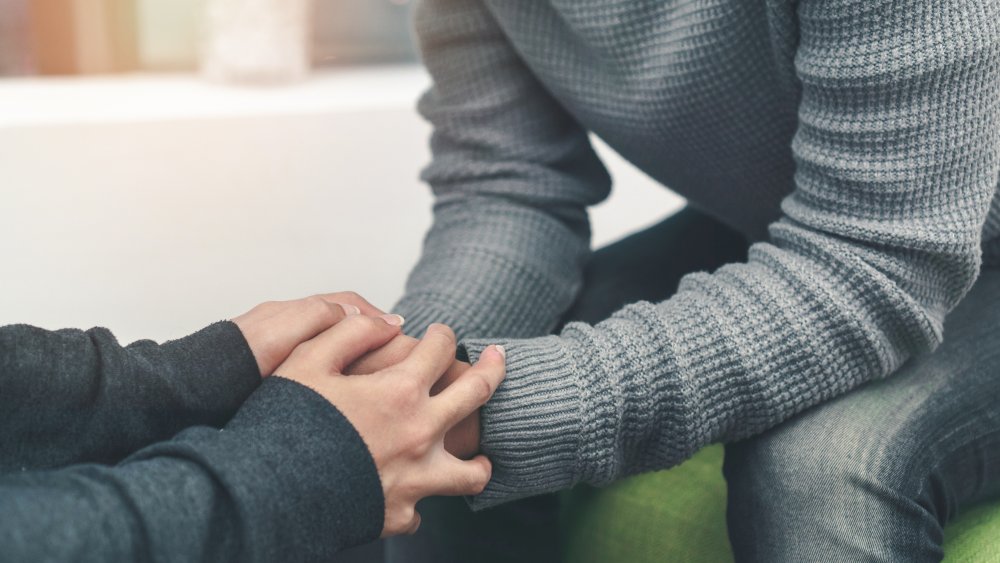The Truth About Lefties
Right-handed people make up roughly 90 percent of the population — so it's understandable that lefties might feel left out. All kidding aside, being a lefty comes with its fair share of everyday challenges, from finding the right bowling ball to using a can opener. Plus, there's a whole lot of stigma to overcome. Per BuzzFeed, the Bible mentions the right hand in a positive light no less than 100 times, but alludes to the left hand in a negative way 25 times. Time reported that anyone who predominantly used their left hand in the Medieval Times was at risk of "being accused of practicing witchcraft." The very word "sinister" is derived from the Latin term for "on the left side," according to Merriam Webster.
Despite this discouraging history, modern-day lefties can rest assured they're in good company. According to Good Housekeeping, at least four of the recent past U.S. presidents, including Bill Clinton and Barack Obama, are lefties, and Oprah Winfrey and Queen Elizabeth II are proud southpaws.
Still, there's more to being left-handed than what meets the eye. In fact, there are a number of considerable health and lifestyle implications. Read on for the truth about lefties.
Most lefties can probably thank their spinal cords
For years, scientists believed that "genetic differences between the left and right hemispheres of the brain determine whether someone is left- or right-handed," according to Business Insider. However, a study centered at Germany's Ruhr-University Bochum in 2017 demonstrated that the "gene expression" responsible for making people righties or a lefties is most likely located in the spinal cord.
So, what led to this foundational shift in thinking? The research unveiled that "human fetuses already show considerable asymmetries in arm movements before the motor cortex is functionally linked to the spinal cord." This connecting of the spinal cord and brain usually happens around 15 weeks gestation, according to Business Insider. While ultrasound technology has proven that some fetuses may show a preference for using one arm over the other at just eight weeks, the media outlet noted, "From the 13th week in the womb, babies tend to suck either their right or their left thumb."
Could extreme stress in pregnancy cause left-handedness?
While genetics take the lead, it's possible that other factors play a secondary part in determining one's dominant hand. In 2014, researchers used 4D ultrasound technology to follow the movements of 15 fetuses throughout different stages of gestation. In total, they took over 50 scans, recorded 342 facial touches, and interviewed the pregnant moms to gauge their respective stress levels. The results? "The more stress mothers reported, the more frequently fetuses touched their faces with their left hands," the study noted.
That said, Dr. Nadja Reissland, the lead author on the study, admitted that the results weren't conclusive: "While we observed a higher degree of left-handed [behavior] in the fetuses of stressed mothers than had been expected, we are not saying that maternal stress leads to a child becoming left-handed after birth, as there could be a number of reasons for this." Still, there's compelling evidence that suggests they're onto something. In an earlier study cited in The Wall Street Journal, researchers studied 1,700 women and their young children and "found that mothers with depressive symptoms or who underwent stressful life events while pregnant were more likely to have left- or mixed-handed children." So it'd seem stress during pregnancy is a factor in people being lefties.
Lefties are more common among twins
It turns out that there is more to being a twin than having a built-in right-hand man (get it?) with whom you can share your childhood. According to Psychology Today, a look at several studies indicated "that 15.09 percent of identical twins and 12.08 percent of non-identical twins were left-handers." To put that in perspective, approximately "10 percent of the general human population" is left-handed, as reported by Live Science.
Interestingly enough, while left-handedness has been proven to be more common among twins than non-twins, not all sibling pairs will have the same dominant hand (per Psychology Today). However, it is true that identical twins may be more likely than fraternal twins to be same-side dominant. Going back to those previously mentioned dark myths about lefties, an article published by CNN noted that "it was also once thought that all left-handed people started out as twins, and that their rightie siblings died in the womb." We suppose not all left-handed fun facts are equal levels of, um, fun.
Are lefties right-brain dominant? It's not that simple
There are anatomical differences in the brains of righties versus lefties. According to Psychology Today, "The area of the motor cortex that controls the hand is bigger on the left side in right-handers, but bigger on the right side in left-handers." But could these brain differences enable lefties to perform better in certain areas and worse in others?
Brain lateralisation is the concept of each brain hemisphere being responsible for certain unique abilities and talents, as noted by The Conversation. With Healthline citing psychobiologist Roger W. Sperry's 1960s theory that the right side of the brain is linked to imagination and creativity, while the left is linked to facts and sequencing, other studies referenced in Psychology Today also show this artistic connection on the right. "When we're left-handed, our right brains are usually dominant, and that's where creativity and intuition are centered," child education psychologist and professor Charlotte Reznick told Fast Company. "So it's often easier for us to be creative than logical. And our brains more easily use both sides of the brain at once, so we have the advantage of also being more flexible in our thinking."
Lefties could be more at risk for developing a mental disorder
Lefties may be more at risk for developing a mental disorder in life. Research published in the Sage Open Journal in 2013 looked at "hand dominance in 107 patients presenting to an outpatient psychiatric clinic with diagnoses of a mood or psychotic disorder." On par with the general population, just 11 percent of those with mood disorders were left-handed. However, left-handedness was found to be a staggering "40% in those with psychotic disorders."
While a 2009 Kevin Denny study published in Laterality quoted in U.S. News suggested that those who are left-handed "are about 5 percent more likely to have reported having ever experienced symptoms of depression," additional The Royal Society Publishing research performed by Geoffrey Brookshire and Daniel Casasanto in 2018 indicated that some standard therapies might be ineffective for left-handed people. "A treatment for certain anxiety disorders and depression involves zapping the left brain. This does not work on left-handers," Casasanto told Healthline, elaborating that lefties, as the outlet put it, would "need their right brains stimulated."
Lefties may perform worse in school
Students who are lefties might find themselves with bigger problems than hard-to-use scissors and uncomfortably curved desks. A 2008 study at the University of Bristol found that left-handed children weren't quite as proficient in school as right-handed students. According to The Guardian, the researchers looked at IQ exams from 10,000 children over the course of a few years. They cross-analyzed the results as the kids grew older, and found that left-handed students "scored about 1% lower in the tests than their right-handed peers."
A simple explanation could be that schools are created to serve right-handed students. An incompatible desk might actually be more than a minor inconvenience. London school administrator Stephanie Kerstein told the media outlet that her own sloppy penmanship had teachers convinced she was dim as a child decades prior. "In fact it was because I was left-handed," she said. "Everything in school and in the workplace is set up for right-handed people, the computer mouse, the ruler, everything."
Lefties look at things differently
Research shows that your dominant hand affects more than just movement — it might even influence your thought process and decision making. Remember researcher Daniel Casasanto? The Cornell professor's 2009 study, cited by Stanford News and published in the Journal of Experimental Psychology, found that right-handed individuals tend to favor objects positioned on their right side, while left-handed people generally gravitate to items positioned on their left side. Casasanto believes that this could have day-to-day implications on one's decision making, with the media outlet noting, "That association could apply in situations ranging from whether we choose one brand of cereal over another simply because of its spot on a grocery store shelf to whom we might identify as a criminal suspect because of their position in a police lineup."
Casasanto and his team also observed the tendencies of presidential candidates from 2004 to 2008. "Righties are more likely compared to lefties to gesture with their right hand when they're talking about good stuff," he said. "And lefties to gesture with their left hand when they're talking about good stuff."
Some lefties have trouble sleeping
Having a hard time getting sufficient shut eye every night? Well, if you are a lefty, it turns out that your dominant side could be a part of the issue at hand. A study in 2011, cited by Live Science, indicated that left-handed people have a greater chance of suffering from bilateral limb movements caused by Periodic Limb Movement Disorder. PLMD is a sleep disorder that causes "repetitive cramping or jerking of the legs during sleep," according to WebMD.
Researcher Dawn Alita R. Hernandez and her team studied 100 patients with PLMD — 84 were right-handed and 16 were left-handed (a pool meant to mimic the general population) — and found that "69 percent of right-handed patients had movements on both sides," while an overwhelming "94 percent of the left-handed patients had these involuntary-slumber movements on both sides of their bodies." This statistical gap could be a result of lefties having a different dominant brain hemisphere than their right-handed counterparts, according to the study.
Lefties may make better athletes for this surprising reason
Don't worry — it's not all doom and gloom if you're a lefty. In a world made for righties, it turns out that being left-handed could give you a competitive edge in sports. Yes, being a southpaw might just make you a better athlete.
One reason, according to the American Association for Advancement of Science, is that most players are not as accustomed to how left-handed athletes "pitch the ball or throw a punch." There is an element of surprise, and other players may not know how to interact or react to lefties' movements.
Another study in Biology Letters looked at statistics for the top 100 players across multiple sports, and found that left-handed players have a particular advantage in "time-constrained sports" like baseball. The American Association for Advancement of Science noted that "players have less time to compensate for the different playing styles of left-handed athletes."
Lefties may have an increased risk of getting breast cancer
Unfortunately, there are other considerable health issues that left-handed people need to be aware of. Research published in the British Journal of Cancer showed that there might be a direct correlation between one's left-handedness and an increased risk of getting breast cancer. The 2007 study deduced that, not only is there a link between the two, but that this already elevated risk is further heightened for left-handed women post-menopause.
According to the study, "Left-handedness may be an indicator of intrauterine exposure to oestrogens, which might increase the risk of breast cancer."
Still, while this is certainly worthy of concern, researchers have noted that the study looked at a limited pool of women and that there were other conditions and variables that could have led to potentially skewed results; thus, further research is necessary. Nevertheless, this serves as another reminder to learn breast cancer symptoms to watch out for and for lefties and righties to be proactive about early detection.
Lefties could be more at risk for developing PTSD
Left-handed people have a greater chance of suffering from post traumatic stress disorder, according to a study published in the Journal of Traumatic Stress in 2007.
Earlier research had shown a connection between left-handedness and PTSD in "male combat veterans and children," but the 2007 study analyzed this link among the greater public. Researchers screened 596 individuals for symptoms of post traumatic stress disorder, and determined that 51 of them could potentially be diagnosed with the condition. What was really interesting, but perhaps not surprising, was the disproportionate number of left-handed people found in that subgroup. Additionally, lefties generally scored higher in "arousal symptoms of PTSD," according to the study's findings.
In another study, reported by The Telegraph in 2011, psychologists showed a clip of Silence of the Lambs to a group of people and found that they "suffered more symptoms associated with post traumatic stress if they were left handed than if they were right handed." According to Business Insider, this might be because "left-handed people are right-brain dominant, and the right brain seems to be involved in fear."
Many lefties make less money than righties
A Harvard University study determined that lefties earn 10 to 12 percent less in annual salaries than their right-handed contemporaries.
According to lead researcher Joshua Goodman, this pay disparity could be the result of "observed differences in cognitive skills and emotional behavioral problems." Furthermore, the research showed that right- and left-handed people often have very different vocational choices and career paths, with left-handed individuals taking on more manual labor, and right-handed people going into more professional fields. This, according to Goodman, could, once again, point to a difference in learning potential. "Those problems may translate into educational problems — in the US, lefties were slightly less likely than right-handers to graduate from college," noted a Vox article.
But don't worry — being a lefty doesn't relegate you to a life of poorly paying gigs and lowly positions. You could become president of the United States. Barack Obama, Bill Clinton, George H.W. Bush, and Ronald Reagan are among the multiple lefties who have held office as Commander in Chief, according to Business Insider.
Are lefties more prone to alcoholism than right-handed people?
A decades-old study by psychologist Paul Bakan questioned a connection between left-handedness and alcoholism. While the researcher himself indicated that the results were far from conclusive, many other scientists throughout the years have tried to make this same connection. For some reason, his rudimentary research planted a seed, and, according to the British Psychological Society, researcher Kevin Denny said that many scientists have suggested the inference that "the stress of being left-handed in a right-handed world is to blame."
The British Psychological Society notes that, while many studies have sought to prove a relationship between left-handedness and alcohol dependence, none have been entirely successful. In an analysis involving 25,000 people from around the world, Denny did discover that, while lefties aren't necessarily more likely to drink in excess, "on average they do drink more often." Presumably more research is needed on the topic.
Lefties may recover from strokes faster
It turns out that left-handed people might recover from strokes faster than their right-handed counterparts, according to research. How Stuff Works explained, "This is because the left side of the brain typically controls speech. Since lefties are less dependent on the left side, they are usually able to bounce back more quickly." Lefties' language and speech dominance may be more evenly distributed between both sides of their brains, enabling them to gain it back more readily after a brain injury.
A study published in Scientific Reports in 2015 also suggested that left-handed individuals may be less likely to suffer from spatial neglect, a post-stroke affliction that causes the inability to see one half of something in front of you. "It's exciting to suggest that perhaps being left-handed might protect you from certain effects of stroke because you have a more bilateral distribution for certain functions in the brain," said lead researcher Corinne Bareham, according to Inside Science.
